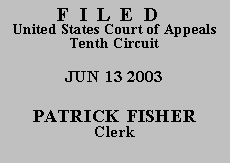

| UNITED STATES OF AMERICA, |
(Western District of Oklahoma) (D.C. No. CIV-98-1024-R) |
ORDER AND JUDGMENT
Before SEYMOUR, MURPHY, and O'BRIEN, Circuit Judges.
After examining the briefs and appellate record, this panel has determined
unanimously that oral argument would not materially assist the determination of
this appeal. See Fed. R. App. P. 34(a)(2); 10th Cir. R. 34.1(G). The case is
therefore ordered submitted without oral argument.
Michael B. Balk, acting pro se,(1) appeals the district court's denial of his motion under Fed. R. Civ. P. 60(b)(4) for relief from final judgment. Exercising jurisdiction under 28 U.S.C. § 1291 (2002), we affirm.
On February 2, 1982, Mr. Balk and several partners signed and delivered two promissory notes to a federal lender, the Farm Service Agency, formerly known as the Farmer's Home Administration. The notes were secured by a second mortgage on certain real properties located in Woodward County, Oklahoma. There is no dispute that Mr. Balk and his partners defaulted on the notes.
On July 27, 1998, the United States, asserting jurisdiction under 28 U.S.C. § 1345,(2) filed a complaint to foreclose its second mortgage and collect outstanding amounts due. Mr. Balk and two of his partners retained counsel and answered the complaint. On August 24, 1999, the United States filed a motion for summary judgment under Fed. R. Civ. P. 56. Mr. Balk did not respond to the motion. By order dated January 25, 2000, the district court granted summary judgment to the United States, and on February 11, 2000, judgment was entered.
On October 9, 2002, more than two and a half years later, Mr. Balk filed a pro se(3) motion under Fed. R. Civ. P. 60(b)(4) for relief from the summary judgment on the grounds it was void.(4) The district court correctly construed Mr. Balk's Rule 60(b)(4) motion to be premised upon three assertions: 1) the court lacked subject matter jurisdiction; 2) there was no justiciable controversy; and 3) the court lacked sufficient evidence to grant summary judgment. The district court found no merit in any of these arguments and denied the motion on October 11, 2002.(5)
"We review de novo the district court's ruling on a Rule 60(b)(4) motion." United States v. Buck, 281 F.3d 1336, 1344 (10th Cir. 2002). "A judgment is void only if the court which rendered it lacked jurisdiction of the subject matter, or of the parties, or acted in a manner inconsistent with due process of law." Id. (quotation and citation admitted).(6) First, in his answer to the complaint, Mr. Balk admitted subject matter jurisdiction under 28 U.S.C. § 1345, and the record clearly supports this statutory grant of jurisdiction. Second, he offers no cogent authority to support his constitutional argument that the case presents no justiciable controversy. In any event, the argument is frivolous. It is beyond peradventure that a suit to foreclose a mortgage granted to a federal lender constitutes a case or controversy under Article III, Section 2 of the United States Constitution. Mr. Balk's final argument, that the judgment lacks evidentiary support, is not cognizable under Rule 60(b)(4). He had the opportunity to make this argument by opposing the United States' motion for summary judgment; he chose not to do so. In any event, we have carefully reviewed the record, and it contains an abundance of evidence to support the district court's decision.
Accordingly, we AFFIRM the order and judgment of the district court. This is a frivolous appeal. Appellant shall, within ten days of the filing date of this Order and Judgment, show cause in writing why he ought not be required to pay double costs to the appellee. Fed. R. App. P. 38.
Entered by the Court:
TERRENCE L. O'BRIEN
United States Circuit Judge
*. This order and judgment is not binding precedent except under the doctrines of law of the case, res judicata and collateral estoppel. The court generally disfavors the citation of orders and judgments; nevertheless, an order and judgment may be cited under the terms and conditions of 10th Cir. R. 36.3.
1. We liberally construe pro se pleadings. Ledbetter v. City of Topeka, 318 F.3d 1183, 1187 (10th Cir. 2003).
2. "Except as otherwise provided by Act of Congress, the district courts shall have original jurisdiction of all civil actions, suits or proceedings commenced by the United States, or by any agency or officer thereof expressly authorized to sue by Act of Congress." 28 U.S.C. § 1345 (2002).
3. We note Mr. Balk was represented by counsel from the outset of the proceedings in the district court until counsel was permitted to withdraw on October 30, 2002. Mr. Balk filed his 60(b)(4) motion pro se even though he was represented by counsel at the time.
4. On motion and upon such terms as are just, the court may relieve a party from final judgment when the judgment is void. Fed. R. Civ. P. 60(b)(4).
5. The district court denied Mr. Balk's Rule 60(b)(4) motion on the additional ground it was not brought within a "reasonable time" of entry of the judgment from which it sought relief. Because we agree with the district court's primary reasoning, it is unnecessary to review the alternative reasoning. But we remind the district court, "[d]espite the language of Rule 60(b) that all motions for relief must be 'made within a reasonable time,' a motion under Rule 60(b)(4) may be made at any time." United States v. Buck, 281 F.3d 1336, 1344 (10th Cir. 2002).
6. Mr. Balk does not argue, nor could he, that the district court lacked jurisdiction over his person, and to the extent his motion may be construed as challenging the foreclosure proceeding on due process grounds, the record demonstrates this argument is without merit.